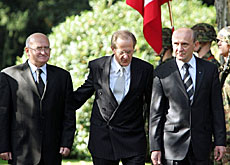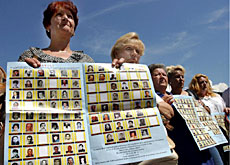Swiss and Bosnian presidents hail progress

Swiss President Joseph Deiss says Bosnia-Herzegovina has made great strides towards returning to normality after being ravaged by ethnic conflict in the 1990s.
But speaking after talks with the country’s president, Sulejman Tihic, he cautioned that there was still work to be done.
Deiss said on Tuesday that the meeting in Bern had focused largely on development aid and economic ties between the two countries.
Bosnia-Herzegovina, which is still recovering from the effects of a war which ended in 1995, is one of the main recipients of Swiss development aid. It has received SFr300 million ($237 million) since 1996.
The Swiss president, who is also the economics minister, said the government was pleased with the “relative normalisation” of Bosnia-Herzegovina in the aftermath of the war.
He cited as examples the local elections which took place without incident over the weekend, and the return of the one millionth refugee to Bosnia-Herzegovina last month.
“But there is still a lot of work to be done,” he added.
Deiss and Swiss Foreign Minister Micheline Calmy-Rey held talks with Tihic and Borislav Paravac, a fellow member of the three-man Bosnian presidency.
Dragan Covic, the third member, was not present due to a death in the family.
Political priority
Since the Dayton Peace Accords that officially ended the war in December 1995, the country has been ruled by a three-man presidency, representing the Muslim, Croat and Serb communities.
Bosnia-Herzegovina featured high on Switzerland’s list of foreign policy priorities in the wake of the war.
Switzerland took in tens of thousands of refugees who fled conflicts in the Balkans during the 1990s.
During the meeting, the Swiss and Bosnian delegations discussed economic issues including an agreement on the protection of investments, which is due to enter into force by the end of this year.
Business trip
The Bosnian delegation is also participating in a business forum in Zurich, organised by the Swiss Organisation for Facilitating Investments, a group that provides services to small and medium-sized enterprises.
“Bosnia still has a lot of ground to make up in economic terms, and the government has decided to take the appropriate steps,” said Tihic.
He said the delegation had informed its Swiss counterparts of reforms currently under way in fields including education, security and finance.
On the political front, he said the process of “normalisation” was advancing, adding that last weekend’s municipal elections had passed “without incident”.
He also insisted that although some nationalist parties had made gains in the elections, they were those that were most open to reform.
swissinfo with agencies
Bosnia-Herzegovina has a population of around 3.9 million.
40 per cent are unemployed and nearly 20 per cent live below the poverty level.
Minority groups and others displaced during the war are among the most vulnerable social strata.
Since 1992, Bosnia-Herzegovina has been an independent country, member of the UN and other international organizations.
Since the war has ended in 1995 due to the Dayton-agreement, the country is, politically, devided into 2 entities and 1 district.
The country is a Swiss foreign policy priority, due to its post-war problems.

In compliance with the JTI standards
More: SWI swissinfo.ch certified by the Journalism Trust Initiative


You can find an overview of ongoing debates with our journalists here . Please join us!
If you want to start a conversation about a topic raised in this article or want to report factual errors, email us at english@swissinfo.ch.